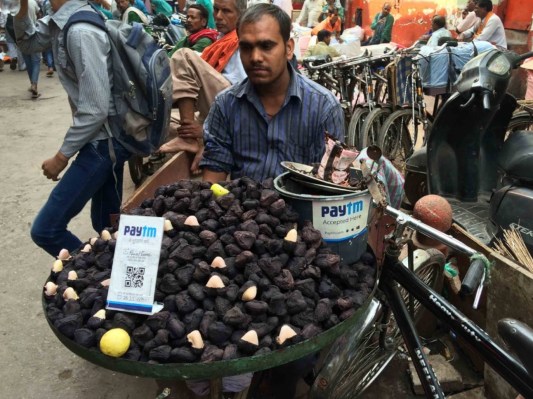WhatsApp is about to get an unlikely competitor in India, its largest global market based on users. That’s because Paytm, the $8 billion-valued company behind the country’s top digital wallet, is in the process of expanding its services into person-to-person communication, games and other mobile content.
The planned update, which was first reported by the Wall Street Journal, will go live in a beta feature that will ship to users before the end of August, a source with knowledge of the plans told TechCrunch.
Paytm declined to comment.
The Paytm app will start out mimicking WhatsApp with chat app features including text, image, video and audio messaging, but it plans to go beyond the basics to integrate more sophisticated features. The model is something along the lines of WeChat in China, which today covers media, payments, ride-hailing, commerce and much more.
Once the initial messaging beta version is live, Paytm will begin working to include WeChat-like communications channels, which are essentially official accounts that allow brands to connect with users, and mobile games and other content. That could allow brands and Paytm merchants to market goods directly to users, and receive digital payment for them without the need for a face-to-face interaction.
This mobile push goes some way to explaining the recent joint venture that the India company created with Alibaba affiliate AGTech Media.
What’s particularly interesting about Paytm’s mobile strategy is that parent company One97 Communication has a history in this space. It started out producing mobile content before it unearthed a mobile payments business and span it out. Another factor: Paytm’s largest shareholder is Alibaba is keen on exploring messaging after it totally missed the opportumity in China. Today its rival Tencent dominates the space with WeChat, which is encroaching on Alibaba’s core payment and commerce businesses.
Alibaba has tried to integrate social features into its Alipay service, China’s dominant digital payment app, but with little to no success to date. You can be sure that the Chinese company has had influence on shaping Paytm’s move into messaging.
Now comes the significance part. Paytm currently claims 230 million registered users. While most media have reported that this is larger than WhatsApp’s 200 million monthly users in India, it isn’t since Paytm’s active userbase stands at 54 million as of July, according to the source.
Nonetheless, there’s a clear crossover here with WhatsApp. The Facebook-owned company is widely believed to have selected India as the market where it will integrate mobile payments — reportedly using the government’s payment system — which would see it tread on Paytm’s turf, although it is still yet to make a move. Hike, meanwhile, a chat app unicorn backed by Tencent, was the first to move into messaging payments in June. But its app doesn’t boast the same widespread adoption as WhatsApp or Paytm, which has hindered the impact of its new feature.
Paytm’s business has rocketed over the past year, primarily thanks to the impact of demonetisation, which saw 500 INR and 1,000 INR notes recalled and spurred digital payments in India. The policy helped the number of Paytm wallets jump from 135 million in August to 177 million by the end of December, while offline transactions went from being 15 percent of its volumes to 65 percent.
Growth is still coming — our source said Paytm processed $1 billion in GMV in India in July — but the company is looking to expand its appeal and engagement with users by moving into messaging and content. (There’s also the potential to make money from social games, as chat app Line showed with $1 billion in revenue last year.) The ultimate goal, TechCrunch understands, is to reach 100 million monthly active Paytm users by end of the current Indian business year — that’s a deadline of April 1 2018.
Beyond payments, Paytm also operates an e-commerce service and is planning to enter the digital banking space.
That spread of interests has given hope to rivals like MobiKwik, which is raising new funding at a $1 billion valuation. Co-founder Upasana Taku recently told TechCrunch that she believes Paytm is over-extending itself, leaving its core payment business liable to disruption. It remains to be seen whether this push into mobile messaging changes things.
